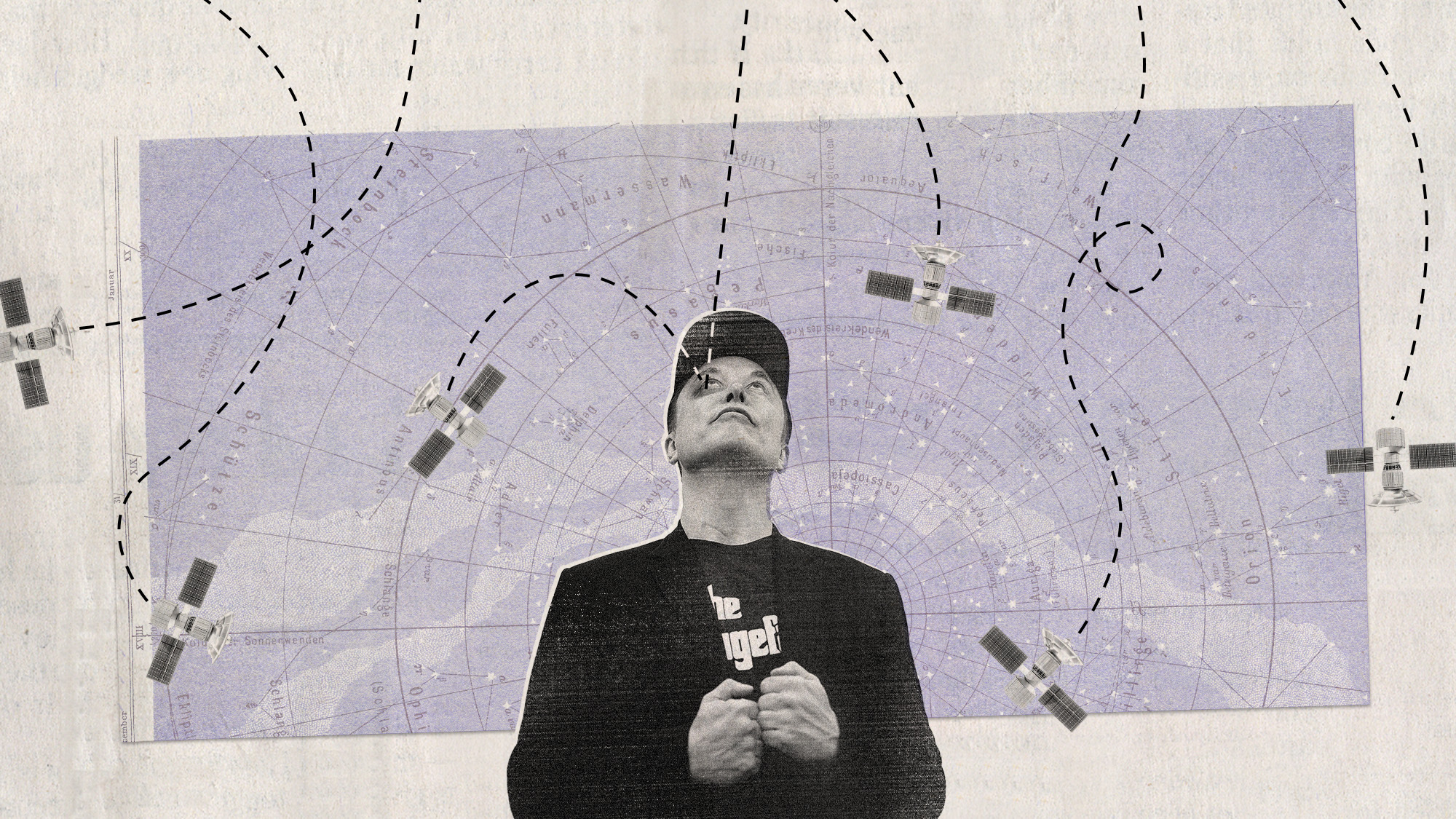Why Elon Musk's satellites are 'dropping like flies'
Fierce solar activity destroying Starlink satellites

A free daily email with the biggest news stories of the day – and the best features from TheWeek.com
You are now subscribed
Your newsletter sign-up was successful
Elon Musk has no shortage of targets for his animosity: the media, "woke" progressives, the trans "agenda" and, most recently, his former best buddy Donald Trump. But one less expected Musk adversary is more powerful than them all: the Sun.
SpaceX's vast network of Starlink internet service satellites are "dropping like flies", due to an extraterrestrial weather phenomenon caused by the Sun, said Futurism. And it's only set to get worse.
'Particularly prone' to early burn-up
The thousands of Starlink satellites orbiting our planet have given space scientists a "golden opportunity to study the effects" of the Sun's activity on the lifespan of these "minimalist, constellation-based spacecraft", said Futurism. And it appears that Musk's "space internet constellation" is "particularly prone to the effect of geomagnetic storms", triggered by eruptions from the Sun, said The Independent. These "ferocious solar storms", Nasa scientists have found, are causing many of Musk's low-orbit satellites to fall to Earth "faster than expected".
The Week
Escape your echo chamber. Get the facts behind the news, plus analysis from multiple perspectives.

Sign up for The Week's Free Newsletters
From our morning news briefing to a weekly Good News Newsletter, get the best of The Week delivered directly to your inbox.
From our morning news briefing to a weekly Good News Newsletter, get the best of The Week delivered directly to your inbox.
The impact is particularly significant at the moment because the Sun is approaching the peak of an 11-year activity cycle, "known as the solar maximum", which provokes "large amounts of extreme space weather".
The earlier than predicted satellite "re-entries" could "increase the chances of them not burning up properly in the Earth's atmosphere". and debris reaching the Earth. However, so far, the "only known instance" of this happening was in August 2024, when a piece of a Starlink satellite was discovered on a farm in Canada.
'Only so much can be done'
The solar storm problem threatens one of Musk's biggest power grabs to date. When his engineers "bundled a batch of prototype satellites into a rocket's nose cone six years ago, there were fewer than 2,000 functional satellites in Earth's orbit". Now more than 7,000 of his satellites now surround Earth, "like a cloud of gnats", said The Atlantic.
This is the most dominant any individual has been in the "orbital realm" since the late 1950s, when Sergei Pavlovich Korolev, the Soviet engineer who developed Sputnik and its launch vehicle, was "the only guy in town" as far as satellites were concerned, space historian Jonathan McDowell told the magazine.
A free daily email with the biggest news stories of the day – and the best features from TheWeek.com
But the Sun is an adversary not even Musk can overcome. Solar storm forecasting "has significantly improved over the past few years", Piyush Mehta, a US professor of aerospace engineering, wrote on The Conversation in 2022 but "there is only so much shielding that can be done in the face of a powerful geomagnetic storm". The Sun is "essential for life to go on," he said, but, like a child who often throws tantrums, "its ever-changing disposition make things challenging".
Chas Newkey-Burden has been part of The Week Digital team for more than a decade and a journalist for 25 years, starting out on the irreverent football weekly 90 Minutes, before moving to lifestyle magazines Loaded and Attitude. He was a columnist for The Big Issue and landed a world exclusive with David Beckham that became the weekly magazine’s bestselling issue. He now writes regularly for The Guardian, The Telegraph, The Independent, Metro, FourFourTwo and the i new site. He is also the author of a number of non-fiction books.
-
 Political cartoons for February 15
Political cartoons for February 15Cartoons Sunday's political cartoons include political ventriloquism, Europe in the middle, and more
-
 The broken water companies failing England and Wales
The broken water companies failing England and WalesExplainer With rising bills, deteriorating river health and a lack of investment, regulators face an uphill battle to stabilise the industry
-
 A thrilling foodie city in northern Japan
A thrilling foodie city in northern JapanThe Week Recommends The food scene here is ‘unspoilt’ and ‘fun’
-
 Nasa’s new dark matter map
Nasa’s new dark matter mapUnder the Radar High-resolution images may help scientists understand the ‘gravitational scaffolding into which everything else falls and is built into galaxies’
-
 Moon dust has earthly elements thanks to a magnetic bridge
Moon dust has earthly elements thanks to a magnetic bridgeUnder the radar The substances could help supply a lunar base
-
 How Mars influences Earth’s climate
How Mars influences Earth’s climateThe explainer A pull in the right direction
-
 The ‘eclipse of the century’ is coming in 2027
The ‘eclipse of the century’ is coming in 2027Under the radar It will last for over 6 minutes
-
 NASA discovered ‘resilient’ microbes in its cleanrooms
NASA discovered ‘resilient’ microbes in its cleanroomsUnder the radar The bacteria could contaminate space
-
 Artemis II: back to the Moon
Artemis II: back to the MoonThe Explainer Four astronauts will soon be blasting off into deep space – the first to do so in half a century
-
 The mysterious origin of a lemon-shaped exoplanet
The mysterious origin of a lemon-shaped exoplanetUnder the radar It may be made from a former star
-
 The 5 biggest astronomy stories of 2025
The 5 biggest astronomy stories of 2025In the spotlight From moons, to comets, to pop stars in orbit